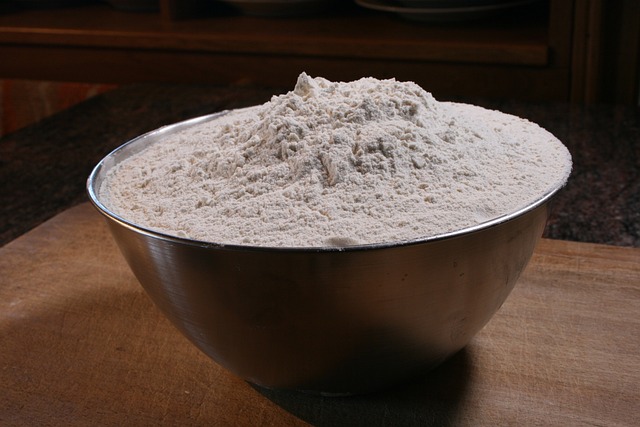Understanding the nutritional profiles of various types of flour can assist in making informed dietary choices and selecting the appropriate flour for specific culinary applications.
Below is a detailed overview of several common flours, including their nutritional content per 100 grams.
1. All-Purpose (White) Flour
All-purpose flour is a refined wheat flour commonly used in baking and cooking. It has a moderate protein content, making it versatile for various recipes.
- Calories: 364 kcal
- Carbohydrates: 76.31 g
- Fiber: 2.7 g
- Fat: 0.98 g
- Protein: 10.3 g
2. Whole Wheat Flour
Whole wheat flour is made from the entire wheat kernel, retaining the bran, germ, and endosperm. This results in higher fiber and nutrient content compared to refined flours.
- Calories: 340 kcal
- Carbohydrates: 61.3 g
- Fiber: 10.7 g
- Fat: 2.5 g
- Protein: 13.2 g
3. Almond Flour
Almond flour is made from finely ground almonds and is commonly used in gluten-free and low-carbohydrate baking. It is rich in healthy fats and protein.
- Calories: 600 kcal
- Carbohydrates: 21.4 g
- Fiber: 10.7 g
- Fat: 54.3 g
- Protein: 20.0 g
4. Coconut Flour
Coconut flour is derived from dried coconut meat and is another popular gluten-free alternative. It is high in fiber and has a distinct coconut flavor.
- Calories: 400 kcal
- Carbohydrates: 57.1 g
- Fiber: 35.7 g
- Fat: 14.3 g
- Protein: 14.3 g
5. Rye Flour
Rye flour is milled from rye grains and is known for its use in traditional bread recipes. It has a robust flavor and is denser than wheat flours.
- Calories: 349 kcal
- Carbohydrates: 75.4 g
- Fiber: 11.8 g
- Fat: 1.5 g
- Protein: 10.9 g
6. Oat Flour
Oat flour is made from ground oats and is naturally gluten-free, provided there is no cross-contamination. It adds a mild, slightly sweet flavor to baked goods.
- Calories: 404 kcal
- Carbohydrates: 65.7 g
- Fiber: 6.5 g
- Fat: 9.1 g
- Protein: 14.7 g
7. Buckwheat Flour
Despite its name, buckwheat is not related to wheat and is naturally gluten-free. Buckwheat flour has a rich, earthy flavor and is used in various traditional dishes.
- Calories: 335 kcal
- Carbohydrates: 65.3 g
- Fiber: 5.8 g
- Fat: 2.0 g
- Protein: 11.1 g
8. Spelt Flour
Spelt is an ancient grain and a relative of modern wheat. Spelt flour has a slightly sweet and nutty flavor and can often be used as a substitute for wheat flour.
- Calories: 367 kcal
- Carbohydrates: 73.3 g
- Fiber: 13.3 g
- Fat: 1.7 g
- Protein: 16.7 g
9. Chickpea (Garbanzo Bean) Flour
Chickpea flour is made from ground chickpeas and is a staple in various cuisines. It is high in protein and fiber and has a slightly nutty taste.
- Calories: 387 kcal
- Carbohydrates: 57.8 g
- Fiber: 10.8 g
- Fat: 6.7 g
- Protein: 22.4 g
10. Rice Flour
Rice flour is made from milled rice and is commonly used for gluten-free baking. It has a mild flavor and fine texture, making it a versatile ingredient.
- Calories: 366 kcal
- Carbohydrates: 80.2 g
- Fiber: 2.4 g
- Fat: 0.6 g
- Protein: 6.0 g
Nutritional Comparison Table of Various Flours
The table below provides a summary of the nutritional content of different types of flour per 100 grams:
| Flour Type | Calories | Carbohydrates | Fiber | Fat | Protein |
|---|---|---|---|---|---|
| All-Purpose (White) | 364 kcal | 76.3 g | 2.7 g | 0.98 g | 10.3 g |
| Whole Wheat | 340 kcal | 61.3 g | 10.7 g | 2.5 g | 13.2 g |
| Almond Flour | 600 kcal | 21.4 g | 10.7 g | 54.3 g | 20.0 g |
| Coconut Flour | 400 kcal | 57.1 g | 35.7 g | 14.3 g | 14.3 g |
| Rye Flour | 349 kcal | 75.4 g | 11.8 g | 1.5 g | 10.9 g |
| Oat Flour | 404 kcal | 65.7 g | 6.5 g | 9.1 g | 14.7 g |
| Buckwheat Flour | 335 kcal | 65.3 g | 5.8 g | 2.0 g | 11.1 g |
| Spelt Flour | 367 kcal | 73.3 g | 13.3 g | 1.7 g | 16.7 g |
| Chickpea Flour | 387 kcal | 57.8 g | 10.8 g | 6.7 g | 22.4 g |
| Rice Flour | 366 kcal | 80.2 g | 2.4 g | 0.6 g | 6.0 g |
Conclusion
Flour selection depends on dietary preferences, health goals, and cooking applications.
Here are some key takeaways:
- Best for High Protein: Chickpea flour (22.4 g), Almond flour (20 g), Spelt flour (16.7 g).
- Best for Low Carbohydrates: Almond flour (21.4 g), Coconut flour (57.1 g).
- Best for High Fiber: Coconut flour (35.7 g), Whole wheat flour (10.7 g).
- Best Gluten-Free Options: Almond, Coconut, Buckwheat, Chickpea, and Rice flour.
- Best for Traditional Baking: All-purpose and Whole Wheat flour.
For those with gluten intolerance, Almond, Coconut, Rice, and Buckwheat flours are ideal choices.
Oat and Rye flours provide a balance of fiber and protein, while Chickpea flour is excellent for protein-packed meals.
Checking ingredient labels and choosing fortified options can ensure a well-balanced diet.


